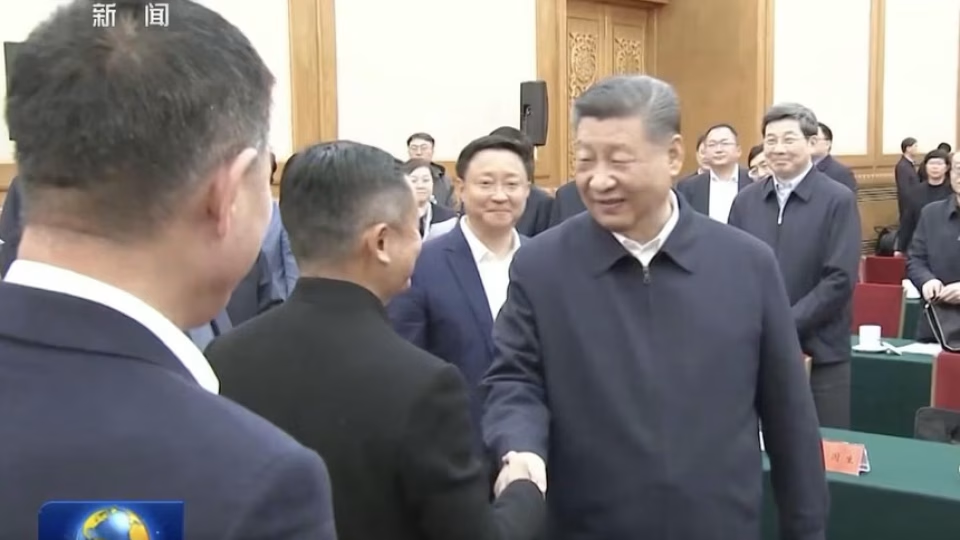February 18, 2025
BEIJING – As Chinese head honchos gathered for a meeting at the Great Hall of the People stood up to applaud the arrival of Chinese President Xi Jinping, a man clad in a black Mao suit looked especially cheerful.
Mr Jack Ma, the co-founder of Alibaba, had every reason to smile.
His very appearance at this rare meeting on Feb 17 between Chinese leaders and the heads of China’s biggest technology firms signals a rehabilitation of sorts for him, and Beijing’s desire to inject confidence into the private sector.
On the nightly news programme Xinwen Lianbo, Mr Ma was briefly shown shaking Mr Xi’s hand, although the former was not cited in state media reports as among those who spoke at the meeting.
The powwow had a star-studded line-up of tech executives such as those from Huawei, BYD, Tencent and artificial intelligence (AI) darling DeepSeek.
Mr Ma is regarded as the face of China’s private sector, but had earlier fallen into Beijing’s bad books.
In 2020, he had notoriously fallen out of the authorities’ favour when an imminent US$37 billion (S$49.6 billion) initial public offering from Ant Group, the fintech firm he founded, was halted. Since then, he has kept a low public profile.
But Mr Ma, who stepped down as Alibaba chairman in 2019 but is still regarded as its spiritual leader, has resurfaced in public in recent weeks.
On Feb 13, he took photos with staff at an Alibaba-owned supermarket in Changsha in Hunan province, days after he visited the Hangzhou offices of Xianyu, an online platform for second-hand goods.
The return of Mr Ma comes as Mr Xi needs private entrepreneurs to boost slowing economic growth with innovation, with an eye to coming out on top in China’s intensified rivalry with the US.
The private sector accounts for more than half of China’s economy, and provides the majority of urban employment and tax revenues. On Feb 17, Mr Xi said private entrepreneurs should have an ambition to serve the country.
“Entrepreneurs should be full of passion for entrepreneurship and for serving the country, strive for perfection, firmly establish feelings for the country, remember where their wealth came from… and promote Chinese-style modernisation,” he said, according to state media.
Developments in recent months have boosted the country’s confidence that it could be at the forefront of innovative countries by 2030, as planned. The guest list at the meeting appeared to be a showcase for some of these successes.
DeepSeek catapulted Chinese AI into global fame in January, when its chatbot’s performance was found to rival the industry’s best even though it was developed at a much lower cost. DeepSeek founder Liang Wenfeng attended the meeting, Reuters reported.
Meanwhile, BYD surpassed America’s Tesla to become the world’s top electric carmaker in 2024. The Shenzhen-headquartered firm threw down the gauntlet last week on autonomous driving tech, promising to bring these high-end, AI-driven features to the mass market.
In September 2024, Huawei announced a new tri-fold smartphone shortly after Apple’s iPhone 16 launch event, which marked its comeback in such high-end devices, made using sophisticated domestically produced chips.
The last time Mr Xi held such a high-level symposium focused on the private sector was in November 2018, which also coincided with heightened US-China frictions during the first trade war under the previous Trump administration.
In that 2018 meeting, Mr Xi vowed “unwavering encouragement, support and guidance for the development of the non-public sector of the economy”, amid rising protectionism and unilateralism.
On Feb 17, Mr Xi repeated that promise. His rallying call for enterprises to serve their country comes as China’s development in areas such as AI and electric vehicles has led to greater effort from the US to maintain its lead in technological innovation.
On this front, private enterprises are a valuable ally. The All-China Federation of Industry and Commerce – a government-backed association of private businesses – said in December 2024 that the sector contributes over 70 per cent of China’s technological breakthroughs.
China politics observer Alfred Wu of the Lee Kuan Yew School of Public Policy said the signalling from the Feb 17 meeting was twofold: to address international challenges and domestic economic stagnation.
“It is certainly good that the government hears from the private sector in person. But it remains to be seen whether this will lead to concrete actions that address their concerns,” Associate Professor Wu said, citing the difficulty in getting loans and dealing with predatory behaviour by local governments, such as profit-driven enforcement.
Mr Xi’s comments at the meeting offered some hope of action on these issues: He said that supervision should be strengthened, especially on “the rectification of arbitrary fees, fines, inspections and seizures”, and that the “legitimate rights and interests of private enterprises” should be protected.
Professor Bert Hofman, an economist at NUS’ East Asian Institute, saw the meeting as a concrete signal that government support for the private sector is real.
He said: “China’s innovation and development depend on a healthy private sector as demonstrated by the people in the meeting – all innovators in their own field.
“The fact that Jack Ma and Pony Ma (chief executive officer of Tencent) were in the meeting is good news for the platform economy, which had been under regulatory scrutiny for some time.”
- Lim Min Zhang is China correspondent at The Straits Times. He has an interest in Chinese politics, technology, defence and foreign policies.

